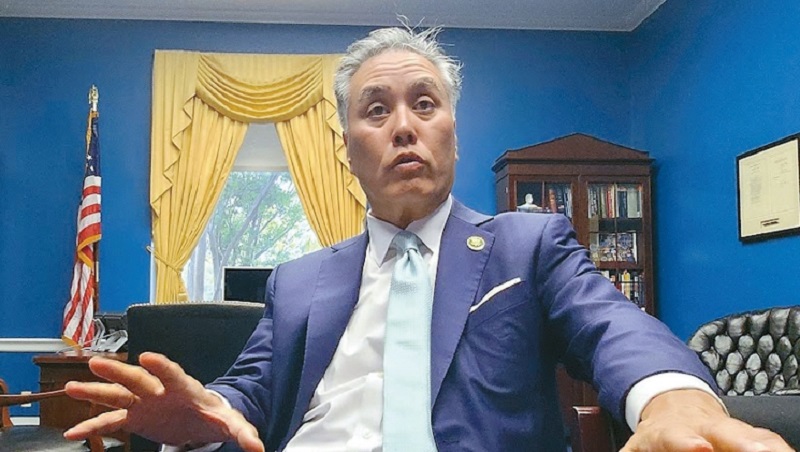Sociology teaches us that hatred or dislike of a particular race often stems from a lack of understanding, manifesting as a means to express fear and resistance. While there are political and ideological boundaries and conflicts, when people of diverse ethnic backgrounds fail to comprehend each other and lack opportunities to foster familiarity, confrontations and violence become inevitable. The past three years, marked by the pandemic and inflation, have further exacerbated these ethnic divisions. In a three-part series, Brian Choi, a political reporter from the Korea Daily, delves into the current state of Asian hate, with a visit to Washington DC, home to the federal government. –Ed.

[STOP HATE: 2]
“At the root of the surge in Asian hate crimes during the pandemic, there has been a massive ‘shirking of responsibility.'”
U.S. Rep. Mark Takano (D-Calif.) characterized it this way. He argues that leaders who did not handle the national crisis well blamed it on Asian countries, creating a social climate of shunning Asians and inciting xenophobia.
Takano has served Riverside (41st and 39th districts), the birthplace of the Korean immigration society, since 2013. Born in Riverside in 1960, he knows the pain of his ancestors’ wartime internment. He also has the distinction of being the first openly gay Asian man to serve in Congress after 23 years as a teacher. Earlier this year, he made headlines for introducing the VALOR Act, a bill to support Korean Americans who served in the Vietnam War.
I caught up with him at the Rayburn House Office Building on Capitol Hill on September 13, and he said he’s very proud of Korean American community leaders like Dosan Ahn Chang-ho and Myung Ki Hong.
Q. You are a former teacher who taught history to students. How do you perceive the roots of Asian hate crimes?
“The wartime Japanese internment is a classic case of fear of Asians being dramatized. There are things that Americans don’t understand. First-generation immigrants and their Asian children were “second-class citizens,” not eligible for citizenship until a group of U.S.-born Chinese sued and won citizenship in the 1880s under the 14th Amendment, which was passed in the 1860s (granting citizenship to descendants of black slaves under the territorial principle). Until the early 1900s, Asians were not allowed to immigrate, so they were excluded from economic activity, homeownership, and more.”
Q. I was told that the house that became the first Asian-owned home in California state after a lawsuit is now protected as a historic site.
“In the 1910s, Jukichi Harada was unable to register his home with his name, so he registered it in the name of his newborn son, who then died. Unable to legally transfer the title, Harada sued and won against the California state constitution, which prohibited foreigners from owning homes at the time. The house was designated as a federal historic site. Records show that after the war, Harada was forced to go to Japanese internment camps, and his children were drafted into the U.S. Army and forced to pick up guns.”
Q. What was the perception of Asians in the United States in the 1970s and 1980s when you were a young adult?
“In the 1950s and 1960s, Asians were viewed in the context of international conflicts such as war, and then the Japanese purchase of Rockefeller Center and the massive importation of Japanese and Korean cars and electronics into the U.S. heightened the wariness. Manufacturing was going to China. Then came the murder of Vincent Chin in Detroit. A white man who hated the Japanese murdered an innocent Chinese man in the street. It was an extreme manifestation of false stereotypes and wariness of Asians. In the realities of the 2020 pandemic, anti-Asian sentiment was maximized. It was national leaders shifting the blame for incompetence onto innocent Asians.”
Q. There’s also the lack of statistics on hate crimes.
“Right. I’m glad that there don’t seem to be any significant reported hate crimes in my district. But along with the reporting system, crime numbers should be reported federally to influence legislation. That’s not happening effectively yet. It’s a big problem.”
Q. Local, state, and federal lawmakers convened last year and vowed to crack down on Asian hate crimes.
“Since then, the Department of Justice has stated they will increase prosecutions and take steps to make data available.”
Q. You mentioned Korean American community leaders, Dosan Ahn Chang-ho and Dr. Myung Ki Hong, as examples of political empowerment and community support in the fight against discrimination.
“I am proud to represent the district where Dosan Ahn Chang-ho, an early leader of the Korean American community in the United States who supported the Korean independence movement, lived, and I admire the late Dr. Myung Ki Hong for the great work he did. At the same time, I am grateful to be able to help Korean veterans of the Vietnam War receive support. The United States must always remember the Korean soldiers who fought in Vietnam.”
BY BRIAN CHOI [ichoi@koreadaily.com]




